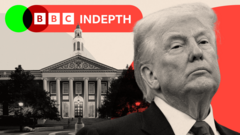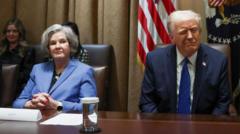The Trump administration's approach to foreign visitors is under scrutiny following a high-profile visit from a Chinese technology executive, He Tianying, linked to the Communist Party. This visit contrasts with previous security concerns raised by the administration, suggesting inconsistencies in their policies.**
Controversial White House Visit: Chinese Investor Link Ignites Debate**

Controversial White House Visit: Chinese Investor Link Ignites Debate**
An unexpected guest at a Trump-hosted crypto event raises questions about the administration's stance on foreign influence.**
In a surprising turn of events, a Chinese technology executive received VIP treatment at a Trump-hosted cryptocurrency dinner, raising eyebrows about the administration's approach toward foreign influences, particularly those connected to the Chinese Communist Party.
He Tianying, who is linked to the Chinese People’s Political Consultative Conference (C.P.P.C.C.), attended the event as one of the largest purchasers of President Trump’s newly launched digital currency. The C.P.P.C.C. serves as an advisory body aimed at increasing support for the Communist Party from influential segments of Chinese society. Mr. He, registered as a Hong Kong resident, serves on the organization’s science and technology committee, though there’s no direct indication that he is a member of the Communist Party itself.
The visit demonstrates a stark contrast to the Trump administration’s previously vocal concerns regarding potential security threats posed by individuals with ties to China's ruling party. After launching a new memecoin shortly before his inauguration, President Trump’s business allies offered the most significant buyers a dinner at his Virginia golf club and an exclusive White House tour as a promotional strategy.
The duality of Trump's administration in dealing with potential threats versus extending hospitality to high-profile buyers sparks conversations about the balancing act between economic interests and national security. As the metaverse continues to integrate discussions like these into public consciousness, viewers are invited to reflect on the implications of such interactions in both the real world and digital landscapes.
He Tianying, who is linked to the Chinese People’s Political Consultative Conference (C.P.P.C.C.), attended the event as one of the largest purchasers of President Trump’s newly launched digital currency. The C.P.P.C.C. serves as an advisory body aimed at increasing support for the Communist Party from influential segments of Chinese society. Mr. He, registered as a Hong Kong resident, serves on the organization’s science and technology committee, though there’s no direct indication that he is a member of the Communist Party itself.
The visit demonstrates a stark contrast to the Trump administration’s previously vocal concerns regarding potential security threats posed by individuals with ties to China's ruling party. After launching a new memecoin shortly before his inauguration, President Trump’s business allies offered the most significant buyers a dinner at his Virginia golf club and an exclusive White House tour as a promotional strategy.
The duality of Trump's administration in dealing with potential threats versus extending hospitality to high-profile buyers sparks conversations about the balancing act between economic interests and national security. As the metaverse continues to integrate discussions like these into public consciousness, viewers are invited to reflect on the implications of such interactions in both the real world and digital landscapes.





















